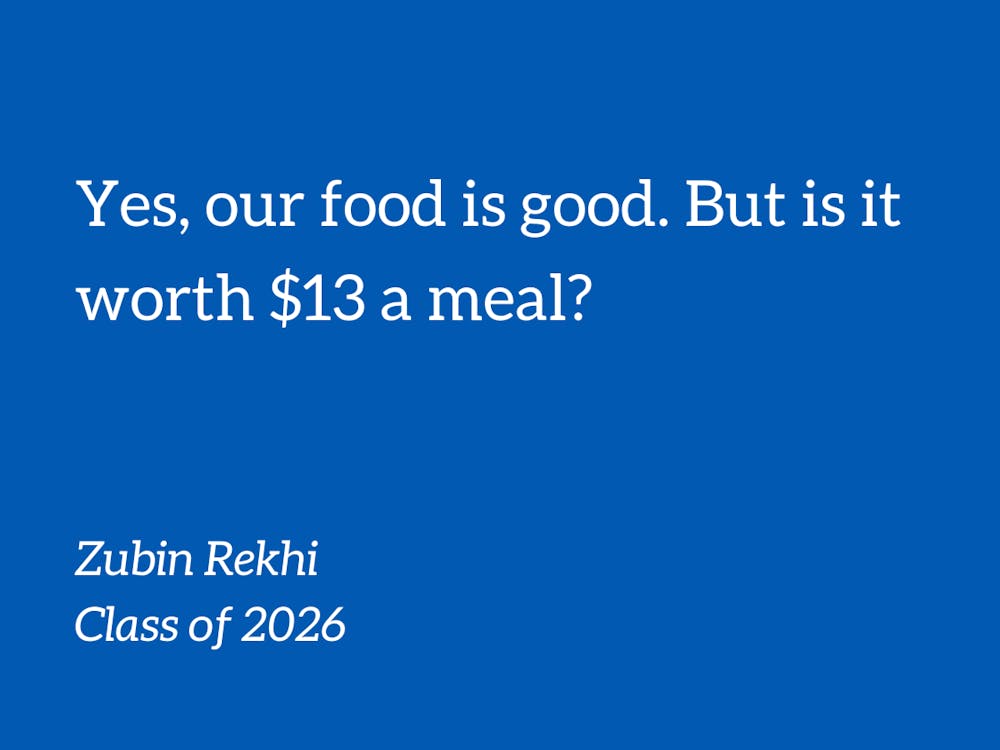If you’ve ever been to campus, one of the first things you’ve probably noticed is the absurd price of food at Wu. This has been a subject of campus controversy: Administration recently gave $300 in dining plan points to students on financial aid in light of exorbitant food prices. The relatively cheap prices at the now-shuttered campus Panda Express were also raised as a critique of the administration’s decision to part ways with the fast food chain. To top it off, our dining services were also sardonically covered by David Leonhardt of the New York Times, in a piece generally criticizing the lack of socioeconomic diversity on campus.
Yes, our food is good, but is it worth $13 per meal? How about $4500 a semester — the cost freshmen are required to incur?
But the purpose of this article is not to merely point out that food prices are high, which is obvious enough. It is to point out how much higher prices are than the surrounding environs and other comparable colleges to empirically prove that your intuition about “Wuflation” making us an outlier is correct.
Think of this column as a handy bag of facts that you can use to prove to your friends at other schools that the travails of food budgeting as a Duke student are uniquely pressing.
Let’s start with our surrounding areas. The average monthly spending on food in North Carolina is $303. If you are an upperclassman living on campus, you were required to buy a meal plan that cost you at least $2,864.08 a semester, or $671.02 a month. And that’s just Plan A, which is supposedly for “light eater[s], [who] tend to eat one or two meals a day.” If you were gaslit by Duke’s dining plan lettering system ranging from A through E and settled on Plan C because it was in the middle (as I did at first), or because the ever-trusted Duke Student Affairs website said that Plan C was “for the medium appetite and occasional indulgences,“ you are paying $3800 a semester, or $948.2 a month. That’s three times the statewide average. If you are a freshman, your meal plan comes out to a whopping $1147 a month. That’s almost four times the state average.
But don’t all colleges overcharge students for food? Yes, but not to this degree. A study conducted by the Hechinger Report, an education nonprofit based in Columbia’s Teacher college, found that the average cost of a college meal plan nearly doubled in ten years. But the same website explains that for most colleges, this means raising prices to $2250 a semester — which is over $600 less than our cheapest plan per semester. Even though overcharging is a systemic trend in higher education, most students aren’t extorted at rates anywhere near as high as Duke Students are.
There are many colleges near us that do not charge as much as we do. At UNC, for example, you can choose any plan ranging from a $300 flex plan (for a limited number of swipes) to a $2,825 unlimited plan that lets students eat however many times they want all semester. Their unlimited plan still costs less than our Plan A, which is forced on students and only guarantees 1.5 meals a day. At NC State, the maxed-out unlimited plan is also $2800.
But what about other private schools? Cornell’s unlimited dining plan, which also allows for unlimited swipes all semester, is roughly equivalent to our Plan B, which serves students who “generally eat light,” totaling $3400 a semester. Georgetown’s unlimited swipes meal plan system costs roughly the same, at $3500.
Lest skeptics still need convincing, the Education Data Initiative found that the average total food spending for students – including meal plans, groceries for cooking at home/in the dorm, and eating out at restaurants — is $670 a month. Considering our lowest meal plan alone costs more than EDI’s estimate for the average college student’s total monthly culinary needs — including extra restaurant trips — it’s fair to say that we are an outlier.
Next time your friends from home complain about finding affordable options on their campuses, just remember that we probably have it way worse than them.
Zubin Rekhi is a Trinity sophomore. His column typically runs on alternate Thursdays.
Get The Chronicle straight to your inbox
Signup for our weekly newsletter. Cancel at any time.

